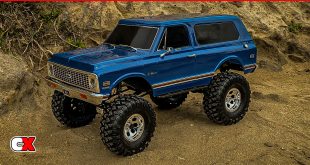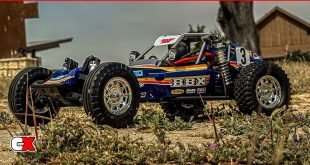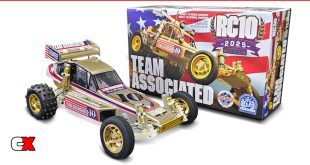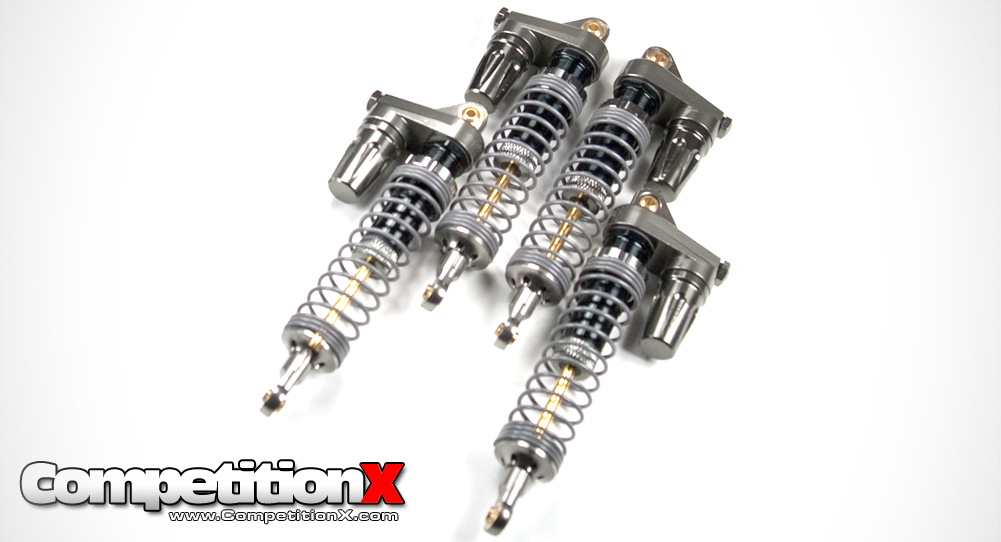
The first episode of my Axial Wraith project had me installing some aluminum goodies to help boost both the look and durability of the crawler. These parts worked great to reduce some of the flex, allowing the Wraith to have a more positive feel out on the rocks.
The next area I decided to work on is the suspension; more specifically, the shocks. For this, I chose the TopCad 105mm Aluminum Piggyback Shocks mainly for the great looks, durable construction and piggyback reservoirs.
Specifics
Product: Aluminum Piggyback Shocks, 105mm
Manufacturer: TopCad, distributed by AsiaTees
Product #: 23002gu (available in other colors as well)
Average Cost: $22.00
Installation Time: About 25 minutes
What’s In The Box
TopCad includes 2 fully built, aluminum threaded dampers complete with installed springs and functional reservoirs. The upper cap, lower cap and reservoir cap all come attached with a rubber o-ring installed to help prevent leakage. There is even a bleeder screw in the cap should you build the shocks with too much pack. A separate bag includes foam oil compensators, aluminum compensators, a couple of washers, spare screws and retaining nuts.
Installation
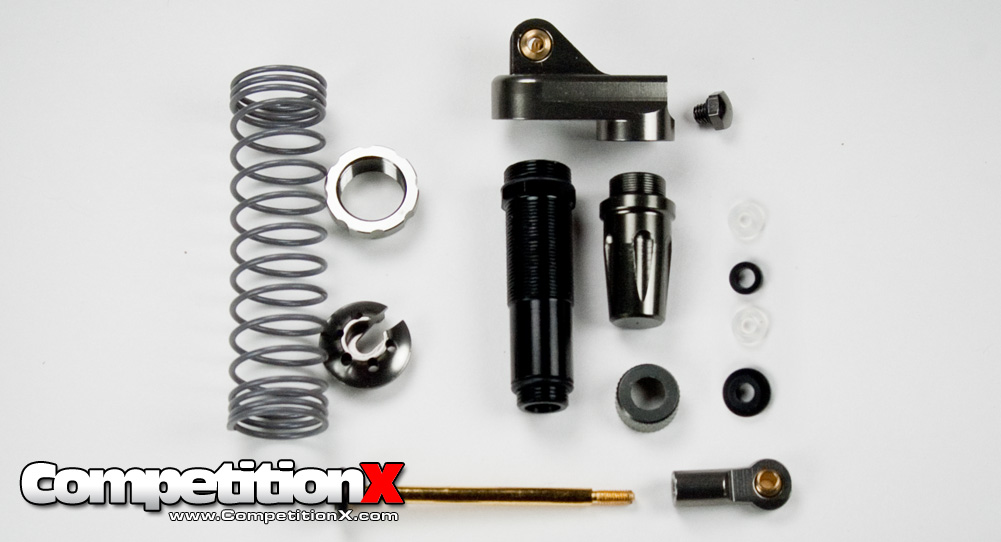
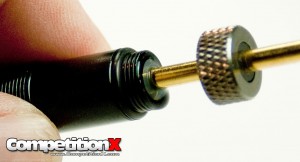
As I mentioned above, the piggyback shocks come fully assembled but you will still need to fill them with oil as well as choose how you want the reservoirs to be built. The operation of the shocks out of the box seemed a little sticky, but this is due to the fact that the shocks are built without any lubrication. To remedy this, I unscrewed the shock cartridge cap (at the bottom of the shock) and put a drop of oil on the shock shaft, re-attached the cap and slowly fed the shock shaft up into the body. Immediately I could feel how much smoother the shock action was! I proceeded to fill each shock with oil, pump the shaft to remove any air bubbles and then let the shocks sit for a few minutes to allow all the bubbles to disappear.
Since the shock kit doesn’t come with instructions, I took this time to research reservoirs to see how they work and hopefully give me a better idea on how to build them. Basically, when the suspension system moves up and down, it causes a state known as kinetic energy. Shock absorbers are designed to dampen this and turns that energy into heat energy, using the aluminum shock body to dissipate the heat. Over rough terrain, this sustained movement can overload a standard, mono-tube shock and cause it to overheat, making the shock oil foam and lose its damping effect. Now you’re relying on only the spring which can cause a bouncy ride and very erratic handling. Reservoirs can help solve this problem by increasing fluid capacity, helping to lower fluid temperatures and reducing shock fade.
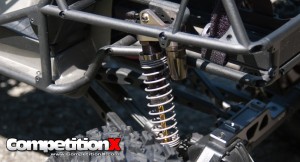
With this new knowledge, I went back to the workbench to finish my shocks. The TopCad shock reservoirs can be built a couple of ways; full oil, oil with 1 foam compensator and 1 aluminum compensator or oil with 2 foam compensators. Since I probably wasn’t going to be blasting through rough terrain at a speed where the I would be overheating the shocks, I wasn’t sure which way I should go so I built three shocks, each with one of the above scenarios and did a bench test to see which felt best.
Before building, however, I knew from experience that the foam compensators needed to be ‘pre-soaked’ with fluid; they are, after all, foam parts that trap air inside – and shocks hate air! I squeezed a puddle of shock fluid into a plastic container, dropped the 4 compensators in and mushed them around until they were nice and soaked. After a pretty extensive benchtop compression test (like, oh, 2-3 minutes tops), I decided to go with the 1 foam/1 aluminum compensator simply because it felt the best.
Once all 4 shocks were built, final installation was a snap. Simply remove the old shocks and install the new ones using the same hardware and same mounting location. Just make sure there is no interference with the reservoirs and any chassis tubing.
Performance
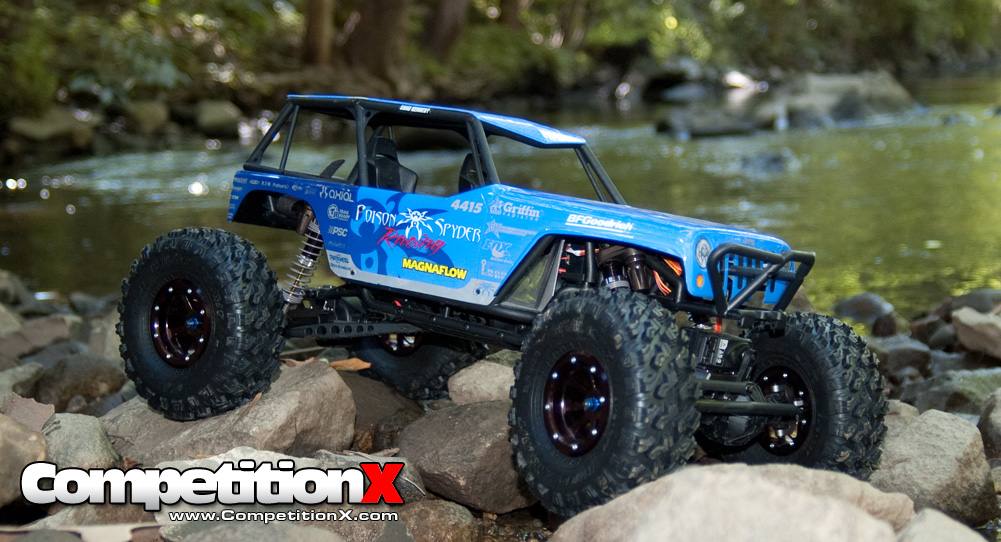
To give my new suspension setup a go, I headed to a local crawling spot that has a pretty intense rock garden. Not only are there a ton of rocks to climb over but also some pretty steep inclines – a great test of both the tires and suspension. I started at the top and slowly made my way down the rocks, focusing on the best lines to reduce the chances of sending the Wraith down the hill in a dramatic end-over-end fashion.
One of the first things I noticed was how sure-footed the truck seemed; the cushy shocks were doing a great job of keeping all 4 tires planted while still allowing maximum articulation in even the worst situations. After completing the downhill run without any issues, I took a short break under a shady tree and gave the truck a close look – especially around the shocks. Everything looked great – no leaks or lost spring perches. It was now time for the hard part – the uphill grind!
I started my trek up the steep hill, a much harder task than before since I had to fight gravity going up! Picking the right line was much more crucial and the tires had to do a LOT more clawing, but the Wraith was awesome. I was feeling a little more comfortable during the climb so I started aiming for more difficult sections to really test the setup, but unfortunately this fuzzy feeling bit me in the ass.
I got stuck in a tall crevice near the top of the climb; the front tires were up and over the rocks but the rears were having a tough time. I stabbed the throttle to try and ‘hop’ it up and over but instead flung the front end backwards! Down the hill the Wraith went, the whole time making those dreaded sounds you hear when plastic meets solid rock. Thankfully I was able to gain control about half-way down, but by this time it had hit quite a few times. I cautiously continued the climb, making it to the top without any further issues. I gave the Wraith a once over, checking the shocks for leaking, bent shafts or dislodged springs or cups. The piggybacks were in excellent condition!
Conclusion
If you’re looking for a new set of 105mm shocks for you Axial Wraith, The TopCad Aluminum Piggyback Shocks are an excellent choice! They are still super smooth after a few runs on the rocks and trails with no signs of leakage. I wouldn’t say the reservoirs are needed if you’re only out for a slow crawl, but for a vehicle like the Wraith where any terrain at any speed is plausible, having these will definitely help keep all 4 tires stuck to the ground.
Price: 8.9
Fit and Finish: 9.4
Installation : 1=Complicated – 10=Easy: 6.2
Durability: 9.1
Value: 8.8
Connect
AsiaTees, www.asiatees.com
Where to Buy
 CompetitionX CompetitionX is the most up-to-date source for RC Car News, Reviews and Videos for Radio Control. We also have the most comprehensive Manual Database on the web.
CompetitionX CompetitionX is the most up-to-date source for RC Car News, Reviews and Videos for Radio Control. We also have the most comprehensive Manual Database on the web.









